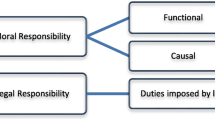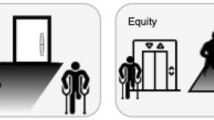Abstract
Codes of conduct are a conspicuous feature of modern business organization, but doubts have been raised regarding their efficacy in ensuring high standards of behavior. Although some of the issues involved have been discussed at some length in the business ethics literature, the amount of systematic empirical evidence on the impact of codes is very limited. This paper seeks to make a contribution to that body of knowledge by studying the policies and procedures of a sample of banks which have signed a statement on banking and the environment promulgated by the United Nations Development Programme. Although some differences are found when compared with a sample of banks which did not sign the Statement, they are not extensive. The implications of the findings, for codes of conduct and for future empirical studies, are then discussed.
Similar content being viewed by others
References
Benson, G. J.: 1989, ‘Codes of Ethics’, Journal of Business Ethics 8.5, 305–319.
Babbie, E. R.: 1973, Survey Research Methods (Wadsworth, Belmont, CA).
Berenbeim, R. E.: 1987, Corporate Ethics (The Conference Board, New York).
Brief, A. P., J. M. Dukerich, P. R. Brown and J. F. Brett: 1996, ‘What's Wrong with the Treadway Commission Report? Experimental Analyses of the Effects of Personal Values and Codes of Conduct on Fraudulent Financial Reporting’, Journal of Business Ethics 15.2, 183–198.
Brooks, L. J.: 1989, ‘Corporate Codes of Ethics’, Journal of Business Ethics 8.2/3, 117–129.
Davis, P. and S. Worthington: 1993, ‘Cooperative Values: Change and Continuity in Capital Accumulation - The Case of the British Cooperative Bank’, Journal of Business Ethics 12.11, 849–859.
Delaney, J. T. and D. Sockell: 1992, ‘Do Company Ethics Training Programs Make a Difference? An Empirical Analysis’, Journal of Business Ethics 11.9, 719–727.
Epstein, M. J. and M. Freedman: 1994, ‘Social Disclosure and the Individual Investor’, Accounting, Auditing and Accountability Journal 7.4, 94–109.
Fink, A.: 1995, How to Analyze Survey Data (Sage, Thousand Oaks, CA).
Harte, G., L. Lewis and D. Owen: 1991, ‘Ethical Investment and the Corporate Reporting Function’, Critical Perspectives on Accounting 2.2, 227–253.
Harvey, B.: 1995, ‘Ethical Banking: The Case of the Co-operative Bank’, Journal of Business Ethics 14.12, 1005–1013.
Hegarty, W. H. and H. P. Sims, Jr.: 1979, ‘Organizational Philosophy, Policies, and Objectives Related to Unethical Decision Behavior: A Laboratory Experiment’, Journal of Applied Psychology 64.3, 331–338.
Kitson, A.: 1996, ‘Taking the Pulse: Ethics and the British Cooperative Bank’, Journal of Business Ethics 15.9, 1021–1031.
Kitson, A. and R. Campbell: 1996, The Ethical Organisation, Ethical Theory and Corporate Behaviour (Macmillan, Basingstoke).
Laczniak, G. R. and E. J. Inderrieden: 1987, ‘The Influence of Stated Organizational Concern upon Ethical Decision Making’, Journal of Business Ethics 6.4, 297–307.
Mathews, M. C.: 1990, ‘Codes of Ethics: Organizational Behavior and Misbehavior’, in W. C. Frederick and L. E. Preston (eds.), Business Ethics: Research Issues and Empirical Studies (JAI Press, Greenwich, CT), pp. 99–122.
Molander, E. A.: 1987, ‘A Paradigm for Design, Promulgation and Enforcement of Ethical Codes’, Journal of Business Ethics 6.8, 619–631.
Otley, D. T.: 1980, ‘The Contingency Theory of Management Accounting: Achievement and Prognosis’, Accounting, Organizations & Society 5.4, 413–428.
Randall, D. M. and A. M. Gibson: 1990, ‘Methodology in Business Ethics Research: A Review and Critical Assessment’, Journal of Business Ethics 9.6, 457–471.
Rich, A. J., C. S. Smith and P. H. Mihalek: 1990, ‘Are Corporate Codes of Conduct Effective?’, Management Accounting (U.S.A.), September, 34- 35.
Ryan, L. V.: 1994, ‘Ethical Codes in British Companies’, Business Ethics: A European Review 3.1, 54–64.
Sarokin, D. and J. Schulkin: 1991, ‘Environmental Concerns and the Business of Banking’, Journal of Commercial Bank Lending 74.5, 6–19.
Schlegelmilch, B. B. and J. E. Houston: 1989, ‘Corporate Codes of Ethics in Large U.K. Companies: An Empirical Investigation of Use, Content and Attitudes’, European Journal of Marketing 23.6, 7–24.
Siegel, S.: 1956, Non Parametric Statistics for the Behavioral Sciences, International Students' Edition (McGraw-Hill, New York).
Smith, D. R.: 1993, Environmental Risk: Credit Approaches and Opportunities, An Interim Report (United Nations Environment Programme, Geneva).
Sorell, T. and J. Hendry: 1994, Business Ethics (Butterworth-Heinemann, Oxford).
Tilt, C. A.: 1994, ‘The Influence of External Pressure Groups on Corporate Social Disclosure’, Accounting, Auditing and Accountability Journal 7.4, 47–72.
UNEP: 1992, Banking and the Environment: A Statement by Banks on the Environment and Do Codes Make a Difference? 177 Sustainable Development (United Nations Environment Programme, Geneva).
UNEP: 1994, Environmental Risk and Commercial Banks: Discussion Paper (United Nations Environment Programme, Geneva).
UNEP: 1995, UNEP Global Survey: Environmental Policies and Practices of the Financial Services Sector (United Nations Environment Programme, Geneva).
Wanless, D.: 1995, The Gilbart Lecture 1995: Banking and the Environment (Chartered Institute of Bankers, London).
Warren, R. C.: 1993, ‘Codes of Ethics: Bricks without Straw’, Business Ethics: A European Review 2.4, 185–191.
Webley, S.: 1992, Business Ethics and Company Codes: Current Best Practice in the United Kingdom (Institute of Business Ethics, London).
Author information
Authors and Affiliations
Rights and permissions
About this article
Cite this article
Cowton, C.J., Thompson, P. Do Codes Make a Difference? The Case of Bank Lending and the Environment. Journal of Business Ethics 24, 165–178 (2000). https://doi.org/10.1023/A:1006029327264
Issue Date:
DOI: https://doi.org/10.1023/A:1006029327264




